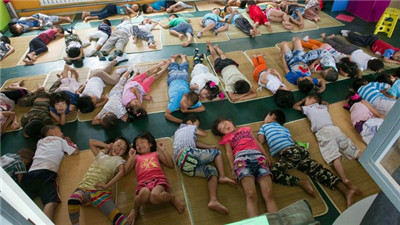(单词翻译:单击)
Yang Yinli, like millions of migrant workers in China, sent her first son to live with his grandparents in the countryside. It was a choice she would bitterly regret.
和中国其他众多农民工一样,杨茵莉(音译)当年把第一个儿子送到了乡下,和祖父母住在一起。这个决定无疑让她后悔不已。
No one was watching the lively six-year-old when he was struck and killed by a truck roaring through the steep village roads. Heartbroken, Ms Yang bore a second son and vowed to raise him in Beijing, stuffing a crib into her tiny shop and keeping a close eye as the toddler played on the pavements.
一辆在陡峭的乡村公路上飞驰的卡车撞上了这个活泼的6岁儿童,夺走了他的生命。事发时,没有大人在看着他。心碎的杨女士后来又生下一个儿子,发誓要将他带在身边抚养。她在小店中塞进了一张儿童床,刚学走路的孩子在人行道上玩耍时,她会小心地看着他。

But new regulations announced this year may force her to send her son, now five, away to be educated. The regulations, which in effect prevent migrant children from entering the first year at Beijing schools, triggered weeks of protests this spring by crowds of anguished parents.
然而,根据今年公布的新规定,为了孩子上学,她可能不得不把今年已经5岁的孩子送走。这些规定实际上阻止外来儿童进入北京小学的一年级就读。今年春天,新规发布后,许多悲痛的父母聚集在一起,举行了为期数周的抗议活动。
The battle faced by migrants for a basic education in Beijing and other major urban centres shows how China is struggling to accommodate the millions flowing to its cities despite a national policy of stimulating urbanisation. “His father could move with him but then what about me? I would still be far from the child,” Ms Yang says, her voice cracking.
外来人口在北京和其他大城市为争取让子女能够接受基础教育所做的斗争表明,中国虽然出了推进城市化的国家政策,但要容纳流进城市的庞大人群非常困难。杨女士嘶哑着嗓子说:“他爸爸可以和他一起走,我怎么办?我还得和孩子分开。”
About 40 per cent of the primary schoolchildren in Beijing lack a city hukou , the official household residency permit that grants access to social services, including education, healthcare and the right to buy homes. Nonetheless, in recent years they have been permitted to attend primary school in the city, a concession that has allowed many migrant couples to keep young children by their side. This school year alone, 470,800 non-Beijing hukou — or migrant — students attended primary and middle school in Beijing.
在北京,大约40%的小学生没有城市户口。所谓户口,是指一种官方的家庭居住许可证明,用以获得包括教育、医疗及购房权利在内的社会服务。不过,近年来外来儿童已被允许就读北京市的小学。政策上的这一让步,令许多外来务工人员可以将年幼的子女带在身边。在本学年,北京中小学非京籍学生(即外来务工人员子女)就有47.08万人。
A relic of the famines during early Communist rule, the hukou system was introduced in the 1950s to keep the peasantry out of cities where food was more plentiful. It has gradually been relaxed as a flood of workers moved out of rural villages to the factories in cities along the prosperous coast but migrants still remain second-class citizens in many of the cities where they have settled.
作为共产党执政早期饥荒年代遗留下的产物,中国的户籍制度从上世纪50年代开始实施,将农民隔离在食品更加丰富的城市之外。随着大量务工人员走出农村,进入沿海繁荣城市的工厂,中国的户籍制度已逐步放开。不过,在许多他们已经安家的城市,外来务工人员依然是二等市民。
Official statistics show that 55 per cent of Chinese, or 749m people, now live in cities, up from 19 per cent in 1980 at the dawn of market reforms, although the real number is probably higher — and still rising. A government think-tank has estimated it would cost about $100bn per year to integrate another 400m people into the cities over the coming decade.
中国官方统计数字显示,中国目前城市人口为7.49亿人,占总人口的55%,远高于1980年刚开始市场改革时的19%。不过,实际的数字有可能更高,而且依然在增长之中。据一家政府智库估计,要想在今后十年让另外4亿人融入城市,每年需花费大约1000亿美元。
Reforms that allow migrants to establish residency in provincial cities have been accompanied by tighter restrictions for some, mostly hitting those who have moved to the biggest cities, or those who often change jobs and residences.
中国最近对户籍制度所做的改革,允许外来人口落户一些省会城市,同时一些城市却收紧了限制,主要受影响的是已经迁进一线城市的流动人口,或经常换工作和居住地点的人们。
“If we were a market economy, the problem of population would sort itself out and resources would flow more evenly. But China is not a fully market economy and a lot of resources are still concentrated in the hands of certain cities,” says Hu Xingdou, an economist who studies migrant issues at the Beijing Institute of Technology. “Under these circumstances we can never have the free movement of people.”
北京理工大学(Beijing Institute of Technology)研究外来务工人员问题的经济学家胡星斗表示:“如果我们实行的是市场经济,人口问题会自动解决,资源会更平均地流动。然而,中国并不是完全的市场经济,大量资源仍集中在一些特定城市。在这种情况下,我们永远都不会实现人的自由迁徙。”
Recent policies — such as the rules on education — seek to push migrants out of the most attractive and high-wage places into provincial cities where there is a glut of new housing. Those policies, a reversal of several decades of population flow into the biggest cities, force migrant parents to once again to face the choice of confiding young children to the care of elderly and uneducated grandparents or to enrol them in distant boarding schools.
最近的政策(比如有关教育方面的规定)试图将外来务工人员从最具吸引力、工资水平最高的地区,引导向盖了大量新楼房的省会城市。这些政策与几十年来人口流向一线城市的大趋势相背离,迫使流动家庭父母再次面临选择:要么将年幼的子女托付给年事已高、没有文化的祖父母,要么让他们就读偏远的寄宿学校。
In May hundreds of migrant parents staged daily protests at education offices in Chaoyang district in Beijing. Videos of one protest show burly policemen dragging off weeping mothers while the crowd chants “It’s not right!”
今年5月,数百名来京务工的孩子家长连日在北京市朝阳区教育管理机构举行抗议活动。其中一场抗议的视频中,身材魁梧的警察拖着一些正在哭泣的女人,人群在喊着口号。
Anger is particularly strong because many migrant parents paid into Beijing’s social security system following tightened regulations issued last year, only to be stymied by additional requirements announced in late April. Those include rental documentation that migrants crowded into temporary housing cannot provide.
去年政府发布了一些更严格的规定后,许多流动儿童父母在北京缴了社保,没想到今年4月底又出了新规定,让人们尤其感到愤怒。这些新规定包括要求提供各种租房证明,对于挤在临时性住房中的外来务工人员来说,他们无法提供这类材料。
The Beijing Municipal Education Bureau referred questions on specific policies to the district. The district bureau said it was too busy preparing for college entrance exams to answer the FT’s faxed questions.
北京市教育局将询问有关具体政策的问题转给了朝阳区方面,而朝阳区教委当时表示忙于迎接高考,无暇答复英国《金融时报》通过传真提出的问题。
At pickup time at one Chaoyang district pre-school, parents exchanged notes. “I think it is unfair,” said Ms Zheng from Fujian Province, the mother of seven-year old twins who were born in Beijing. “Why should migrant children be separated out?” She declined to give her full name for fear of damaging the boys’ chances of somehow entering school.
在朝阳区一所学前学校,家长们在等待接孩子时交流意见。来自福建的郑女士有一对七岁的双胞胎,两个孩子就出生在北京。她说:“我觉得不公平。为什么外来人口的子女就应该被区别对待?”由于担心会影响到两个孩子或许有可能的在京上学机会,这位女士拒绝透露全名。
Ms Zheng had hoped regulations would evolve to allow her twins to someday attend high school in the city. Currently, children can only take the university entrance exam where their hukou is registered, exiling city kids to provincial towns hundreds of miles away just as they hit their teenage years. Grades plummet and it is common for children who were decent students in the cities to drop out once they are far from their parents. Sexual abuse and delinquency are growing concerns.
郑女士希望政策变化会让她的双胞胎能够在某一天入读北京的中学。目前,中国的中学生只能在户口所在地参加高考。众多城市小孩到了十几岁时就得回到几百英里以外的本省城市上学。一旦孩子们远离父母,他们的学习成绩可能会直线下降,城里原本的好学生出现退学的现象也屡见不鲜。此外,儿童性侵害现象和青少年犯罪也日益令人担忧。
Some desperate teens have made national headlines. In May a 12-year-old girl who had attended at least two years of school in Beijing before being sent back to a desolate village in Sichuan province killed herself and poisoned her grandmother with pesticide.
不时有一些绝望的少男少女成为全国新闻焦点。今年5月,一名12岁的女孩用农药给奶奶下毒后自杀。这名女孩曾在北京上过至少两年学,之后被送回四川省偏远的农村。
“It has a great impact on the children but our nation doesn’t think about this much,” says Prof Hu. “We say if the nation is unwilling to build an extra school in the cities today someday it will end up building an extra jail.”
胡星斗教授表示:“这会让孩子们受到非常大的影响,国家对这个问题却没有考虑太多。我们说,今天国家不愿在城市里多修一所学校,他日就得多修一所监狱。”


